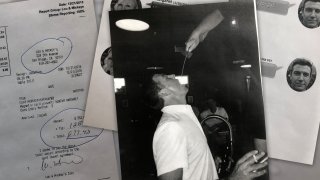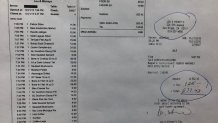
Days before former Rep. Duncan D. Hunter is scheduled to be sentenced for campaign finance misuse, federal prosecutors argued his “wide-ranging and dangerous assault on our system of justice" warrants a 14-month prison term.
“Rather than admit his guilt and resign his seat… Hunter chose to mislead the more than 700,00 people who reside in the 50th congressional district,” government lawyers argue in a scathing 80-page sentencing memo filed in Federal Court Tuesday night. The memo also includes a detailed accounting of Hunter’s illegal expenditure of campaign funds for personal use.
Hunter pleaded guilty last December to misusing more than $150,000 in campaign contributions. His sentencing is scheduled for next Tuesday, March 17.

According to court documents, Hunter’s probation officer recommends 11 months in custody for the retired Marine and Iraq war veteran.
But Hunter’s lawyer said in his own sentencing memo that his client’s acceptance of guilt and “contrition” for his crimes, combined with his military service and strong support for military veterans, are an impressive counter-balance to his financial crimes.
Instead, the defense argues 11 months home detention and 1000 hours of community service are a fitting punishment for the former East County politician.
The prosecution’s sentencing memo detailed how Hunter misused campaign funds, like the thousands of dollars spent on a “mistress” whom he first met in 2009. Those expenditures included almost $2000 for “a romantic weekend” with his girlfriend in Lake Tahoe, for which he used “a convention in Reno as a cover.”

Prosecutors said the Hunter family’s “profligate lifestyle” depleted their bank accounts and drove them deep into debt. According to the government’s sentencing memo, Hunter once had to ask his wife, Margaret, if they had enough money to buy a pair of nail clippers.
“In order to support their spending and pay their bills, the Hunters turned to pilfering hundreds of thousands of dollars donated by citizens” that by law could only be used to fund his congressional campaigns.
“Beginning as early as 2009, the Hunters used campaign funds to purchase items as inconsequential as fast food, movie tickets, and golf outings; as trivial as video games, beachwear and coffee; as mundane as groceries, utilities and garage doors; and as self-indulgent as luxury hotels, overseas vacations and designer face cream,” wrote Assistant U.S. Attorney Phillip Halpern.
Despite his knowledge of wrongdoing, prosecutors argue that “Hunter’s false narrative about being an innocent politician framed by a partisan Justice Department influenced his 2018 re-election to Congress.
"There should be severe consequences when an elected representative seeks to cover up corruption by hiding behind lies.”

But Hunter’s lawyer, Devin Burstein, counters that his client’s admission of guilt justifies a lighter sentence. According to the defense memo, Hunter told his probation officer, “I pleaded guilty because I am guilty. I misspent campaign funds to cover personal expenses, and I allowed Margaret to do the same… I failed in my personal behavior.”
The defense filing includes letters from Hunter’s former colleagues, family and friends, who vouch for Hunter’s character and describe the disgraced congressman’s regret for his behavior.
“I have seen Mr. Hunter weep because of the suffering he caused his family,” wrote Democratic Rep. Juan Vargas (CA-51). “I know he feels great shame for what he has done.”
Hunter’s lawyer argues that home detention is an appropriate punishment and a “substantial deprivation of liberty. It is a 24/7 restriction to the home, with narrowly-tailored exceptions for community service, work, medical treatment, and church attendance… While home detention is not jail, nor is it freedom.”



